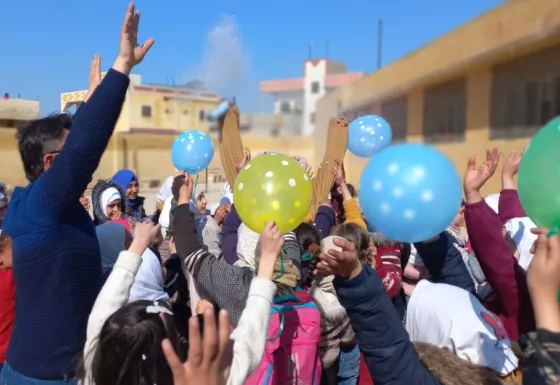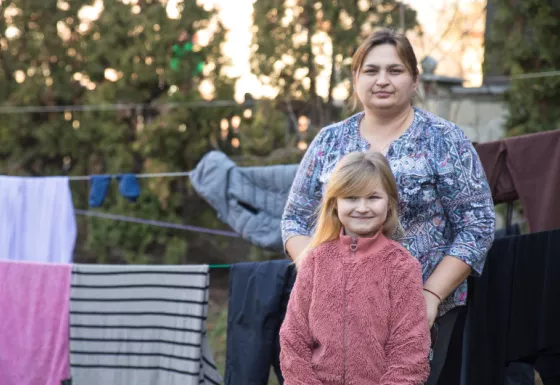While meeting childrens physical needs is essential when they face the horrors of bombs and natural disasters, addressing their emotional needs is just as crucial to alleviate fear, anxiety, and depression.
At War Child, we collaborate with our partners to help children in challenging circumstances find a sense of normalcy. Together we establish child-friendly spaces to facilitate mental health and psychosocial support interventions including:
- Areas for play and learning
- Counselling support
- Support for parents and care givers
- Training for supports workers and community-based groups
Our focus is on helping children express themselves, to rebuild their self-assurance and trust, and increase their capacity to cope with and overcome the effects of war and natural disasters.
Our work in action - Syria
In the aftermath of the earthquakes in Türkiye and Syria, War Child and our partners provided psychosocial support to those affected.

“I remember early on, in the first days after the first earthquake, we would go to the field to talk to children and their caregivers. You could see that they were still in shock. Our role at the time was to listen to them and give them the space to talk.
When we would ask them “how do you feel?” and give them the space to talk, they would respond with just a smile maybe or a tear, but they wouldn't really talk. That’s because they were still in shock. Then two days on, with consistent visits and support, we could see that they started to really process the shock. They were able to express themselves, talk about their experience and how they're feeling. This was our role, to provide them with an ear to listen, to just calm them down and help them deal with the shock.
Then we started structured sessions and we focused on trying to get the children into a normal routine either through recreational activities or through movement-based activities and psychological support sessions. We wanted them to know how to deal with their new reality, to understand it and to know that there is still space for them to laugh smile and play.” - War Child partner, Syria
Our work in action - Ukraine
Maria and her mother, Ivanna, were forced to flee their home in Kharkiv due to the ongoing conflict. They have been living at a War Child supported refugee shelter for several months now, where we recently had the opportunity to speak with them.

Maria held tightly onto her stuffed toy dog Rex, a present given to her by the shelter at Christmas. It was the only toy she had, and it gave her comfort when she felt scared or alone.
Children escaping conflict arrive with very little possessions, having abandoned their homes and childhoods. They are forced to grow up too quickly. This underscores the crucial significance of our psychosocial support, which enables children to simply embrace their childhood—to engage in play, access toys, and pursue their education.
Ivanna reflected on the bombs that fell around them in Kharkiv and couldn't help but cry as she thought about how close she came to losing her family. "I don't remember what it was like before we left," she said. "I've blocked it out. The only thing I could think of was that I had to save my children's lives." Her husband and eldest son are still in Kharkiv, and their safety is a constant worry.
Despite the trauma they had experienced, Ivanna has found solace in the community at the shelter. She has made new friends and has found purpose in helping others. She lends a hand to the other residents whenever she can. "We live and work here. We have fun here," Ivanna said. "We are a family together."
The shelter provides them with food, a roof, and other basic necessities, but it is the psychosocial support they have received that made all the difference. This support helped them cope with the emotional toll of their displacement. They helped Maria express her feelings through art and play, building her confidence and resilience.
Despite the challenges they face, Maria and Ivanna have found comfort and support in the shelter. They know that War Child, our partners, and the community they had found will support them as they rebuild their lives. Their journey is not over yet, but with the help of War Child, they know they can overcome the difficulties and start anew.

